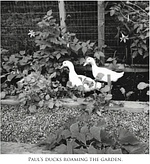Backyard Homesteading
As recently as a decade ago, telling a stranger that you raise chickens in your suburban backyard might have led to an awkward pause in the conversation, but now it is often met with admiration. A growing awareness of how much we all consume and the idea that there is something we can do to reduce our reliance on others to produce for us has started a quiet revolution.
Innovations in agriculture, the advent of factory farming, refrigerated railcars, and wonderfully stocked supermarkets offering watermelon in January create an unquestionably efficient and affordable system that is hard to compete with. However, the idea that we can do something to have even a little control over this system is very appealing to many people.
Keeping a garden, raising poultry, keeping honeybees, canning seasonal produce and even installing solar panels are all examples of things we can do to become self reliant. My wife and I jumped head first into this world by deciding to raise ducks. After Googling “raising ducks” I was very intimidated by how much there was to learn, but also very impressed on how much information was available. After settling on a breed (Golden Layer 300’s) and a quantity (4), I called a supplier who was a pretty amused when I placed an order for only four ducklings because apparently you get a volume discount starting at two hundred ducklings. Two days later they arrived at the post office where I received a call by our postman that my package was making noise. A few books, an incident with a raccoon and a couple of bags of feed later, we now have a happy pair of ducks that we are told will lay over 600 eggs a year. It is easy to argue I could buy eggs for the rest of my life without spending the time, money and energy that it takes us to raise ducks, but the satisfaction of having one need in our lives insulated from the rest of the world is a unique experience.
Growing a garden is a more common way we can produce for ourselves. Although much less exotic than raising heritage livestock, it can be extremely rewarding with very little upfront cost, assuming you can keep our aggressive, clever and very ambitious local deer away from it. A vegetable garden can be surprisingly productive with only the minimal cost of seeds, water and some elbow grease to keep it producing for over half the year. Many techniques such as high density planting methods enable you to produce an impressive and continuous source of food during most months when snow doesn’t cover the ground. Stagger planting is another great way to take your garden from a hobby to a reliable food source. By planting the same seeds in succession over the course of a few weeks, they will grow in succession creating an ongoing harvest for that particular crop. This is also cheap insurance in case a hungry woodchuck finds it’s way into your garden.
Canning and beekeeping have also become welcomingly trendy in recent years. Preserving the crop of your well-kept garden or even seasonal vegetables from the farmers market has been the topic of many recent books, including those from authors who would not normally be associated with the homesteading movement. Eugenia Bone’s Well Preserved: Recipes for Putting Up Small Batches of Season Foods is a must read for anyone that has ever felt the guilt associated with overbuying at a farmers market. Canning and pickling can sound very intimidating, but the difference between a novice and an expert is just a little trial and error. Our local Shop-Rite has an entire section dedicated to canning with everything needed to turn your extra garden cucumbers into amazing pickles.
Beekeeping is undergoing such an incredible resurgence from its commercialized base back to local hobby hives that new patents for hive design and new businesses for hive management have taken off in recent years. The essential and irreplaceable role of honeybees has been well publicized in recent years with the issue of colony collapse disorder creating a spotlight. However, the role of local beekeepers is sometimes forgotten. What is not forgotten is the product of the bee’s hard work; local honey produced from our local flora.
Living as a consumer in our efficient society makes it difficult to realize how rewarding it can be to self produce anything. Making your own soap, raising chickens, or any other hobby that can make you or your family more self-reliant can be rewarding in a way that is difficult to understand until it has been experienced.


